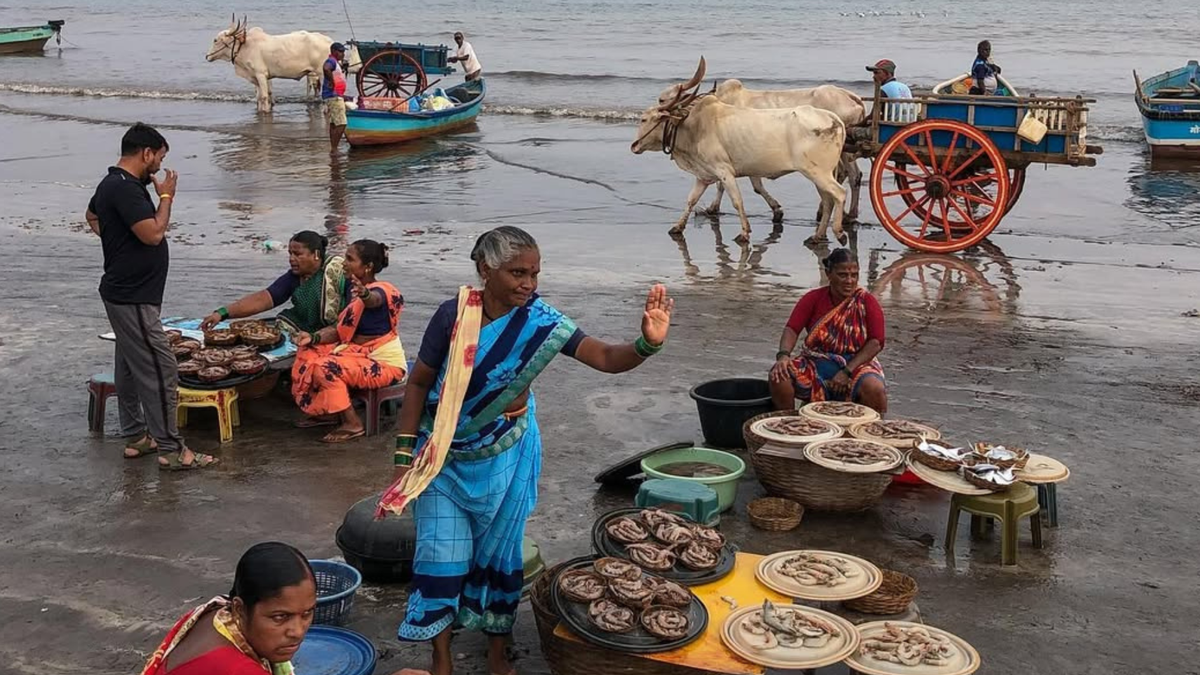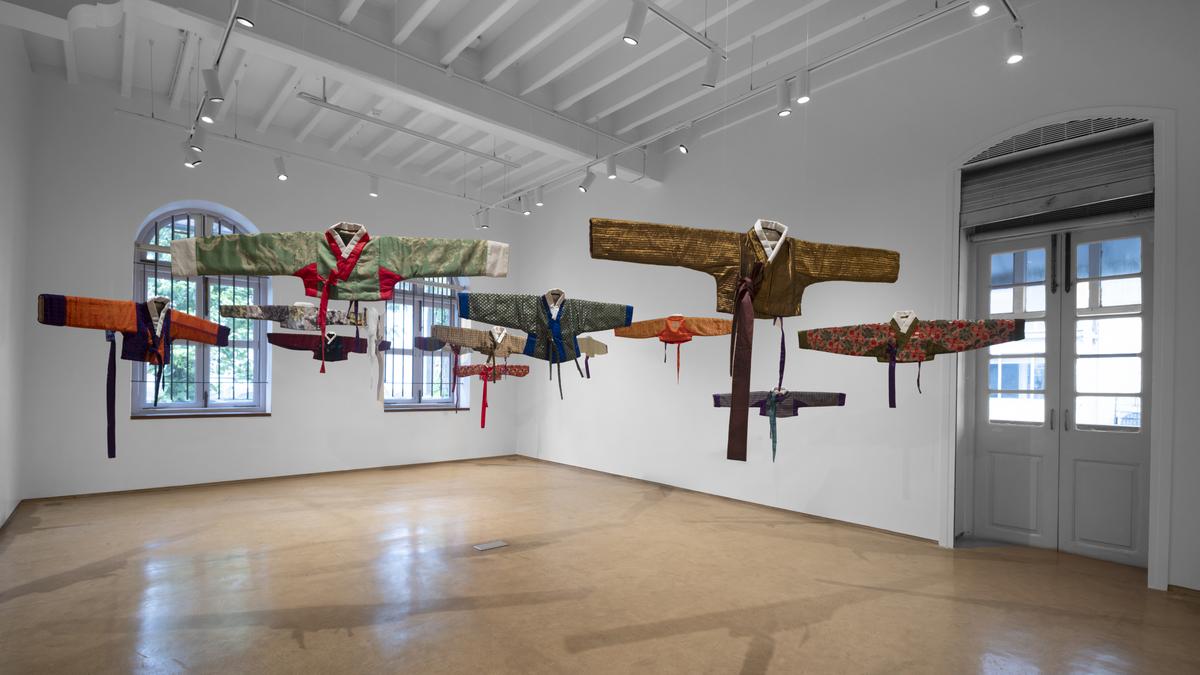“The woman sitting next to me. The doctors still hoping to save me. My crazy friend. Another woman, who had dedicated her life to me. My mother. My father. The lanes of Kasi. My body, which had left me. And my heart, with fire still burning within. I could have gotten up. But for whom? I could shout. But for whom? Everything was melting away from me — my love, Zoya, Bindiya, Murari, and the scent of Kasi. Why should I hold on? This fire within me could have either kept me alive or killed me. But why do I need to get back up? Who could once again endure all the pain, fall in love again, and suffer heartbreak? Can someone ask me not to leave? The stone-faced Zoya sitting next to me — even now, I would go back to her if she wished for it. But I won’t. I think there’s more reason in closing my eyes and embracing the eternal slumber. But one day, I shall return. To play the tabor on the same shores of Ganga, to fly in the same streets of Kasi, and to fall in love with a Zoya again.”
It’s been 12 years since Kundan Shankar promised to return to Banares, but the unhealed scars of the above monologue still bear witness that he lives tall in the hearts of Hindi and Tamil audiences. When Kundan (played by Dhanush) bid his goodbye, those watching Raanjhanaa (Ambikapathy in Tamil) for the first time couldn’t grapple with the idea of the narrator of the story dying (His death came as a shock, unlike the case in films like American Beauty and Sunset Boulevard, also told posthumously by a dead narrator). However, Kundan, to be blunt, was always doomed to die at the end of the film. Kundan had to die so the light he emanated could live. Every time AR Rahman’s stirring soundtrack played, we reminisced about a chirpy, naive young man, consumed by a love with splinters, smiling and dancing along the colourful streets of Banares.
And now, 12 years since he left us, Kundan has controversially returned to the big screen, becoming fodder for a kitschy attempt at using Artificial Intelligence for an alternate ending that besmirches the very idea of why he existed in the first place. In this version of Ambikapathy, which was released in Tamil Nadu theatres on Friday, Kundan lives. After Zoya (Sonam Kapoor) gently graces his face, the producers shockingly cut away the entire monologue of Kundan and instead intercut flashbacks of Kundan and Zoya to suggest some newfound reciprocation of love from his love interest. He then turns towards her and half-opens his eyes to look at her. Bindiya (Swara Bhaskar) and Murari (Mohammed Zeeshan Ayyub) flash a creepy, uncanny valley smile, and then, Kundan wakes up. Forgetting that he has a bullet wound to his abdomen, he gets up from the hospital bed all so casually as if someone called him for breakfast.

Eros Media World’s announcement of a re-release with an altered AI-generated “happy” ending has attracted flak from netizens and filmmakers, and rightfully so. A ‘heartbroken’ Aanand disassociated from the re-release and called it “a reckless and dystopian experiment” in his chat with PTI. He added that doing so without discussion was “a gross violation not just of the film, but of the trust of the fans who’ve carried the film in their hearts for 12 years.” Meanwhile, Eros Media World’s CEO Pradeep Dwivedi told PTI that it was “a creative reimagining, not a replacement, and is consistent with global industry practices, including anniversary editions, alternate cuts, and modernised remasters.” Nevertheless, the news attracted quite a lot of attention, and an afternoon show at a multiplex in Chennai saw a full house today. It had also given rise to fan theories, like whether Kundan would end up with Bindiya. Or if Zoya saves Kundan at the rally, and he gets hospitalised for a less fatal reason.
However, the climax presented in theatres confused audiences, who wondered if there was a point in resurrecting Kundan when there was no intention to show how his equations with Zoya and Bindiya would pan out. Firstly, such a climax highlights many inconsistencies in Kundan’s arc. Right from the beginning, we are shown how fierce and destructive his all-consuming, fanatic obsession over Zoya can be. His low self-esteem compelled him to self-harm, believing that getting Zoya’s sympathy for him could win over her heart as well. Going to the political rally towards the climax, knowing that there were plans to kill him, was also his way of ‘slitting wrists’ to win over Zoya.

Grappling with the guilt of causing Jasjeet Singh’s (Abhay Deol) death, he followed Zoya, hoping that doing what she asked him to do could release him of the guilt. And Zoya, consumed by revenge and hatred, had asked him to die for Jasjeet’s cause. In Jasjeet’s death, Kundan saw what could have happened to him if this were the fate of a man far more privileged. He struggled to live with the fact that his need for revenge gave eternal grief and despair to Zoya. He carried the guilt of how he had also exploited Bindiya’s affection towards him. The new climax strips away this exploration of guilt and grief, and reduces its vision to answer just one senseless point — “Does Kundan get Zoya?”
Kundan waking up and sharing a moment with Zoya spills another character inconsistency. In the original version, the moment captured how, in Kundan, Zoya finally saw the man she had always looked for, who she later found in Jasjeet — a man who would do what was right and go to any extent for it. In his quest to win her love, Kundan went to the rally knowing he would die, moments after asking her not to lie about her love for him. Zoya grazing his face was her way of apologising to him, having understood that while he may be the man who caused her so much pain, there was innocence in how devoted he was to her. She had begun to admire his adoration for her.
After all, Zoya herself had been grappling with guilt. While she blamed Kundan for Jasjeet’s death, she was troubled if it was her plan — to hide his Hindu identity from her family — that took him away from her. If that was for love, it was for hatred that Zoya went to the extent of sacrificing Kundan for Jasjeet’s cause. Later, at the press conference, she had to sacrifice her future to bring the Chief Minister down and ensure there was no power struggle within the AICP. All of this played out in the moment she shared with Kundan. Here, the ending changes the meaning of the moment. It spells not guilt or grief, but romance. She is shown to be reminiscing about the moments she shared with Kundan since childhood. But how could that be possible when she had no memory of Kundan at that age? He had meant nothing to her until he became the man who helped thwart her father’s plans to get her married off.

Also, what does this mean for the future? What happens to Zoya and Kundan’s equation? Where does this leave poor Bindiya, who is now reduced to a mere pawn in the story (more so than the original)? With his death, as the monologue had stated in the original, a part of her lived with him till the end, pricking him for how he had treated her. In this version, she’s just a victim of a love triangle, which even robs us of that sliver of comfort in knowing Kundan finally saw himself in her devotion.
Overall, the AI-altered climax of Ambikapathy is a tasteless, unwarranted rendition that taints the memory of the film. This raises doubts about whether the producers saw Kundan as an ideal hero and not as the flawed man he is — one who had to have a “happy ending” that somehow even justifies his unrequited obsession over a woman who repeatedly said ‘No.’ And it’s baffling that the makers missed out on using AI more productively, like when Kundan reads poetry from a piece of paper while proposing to Zoya. In the Tamil version, he reads a Tamil poem, but a close-up shows Hindi script written on the paper (Raanjhanaa wasn’t shot in Tamil but dubbed as Ambikapathy). Perhaps AI could have helped mask the original with a poem written in Tamil.
Regardless, it still puzzles why the perfect climax of the film, in tact with a monologue that perfectly captured the essence of this troubled character’s troubled obsession, had to be changed. This isn’t an ideal romance story that ended up sour to the dismay of the audience. The new climax is a cop-out that raises a red flag on what Artificial Intelligence can pave the way for in tone-deaf, artistically impaired hands. What’s next? Kamal Haasan/Shah Rukh Khan beating cancer in Vaazhve Maayam/Kal Ho Naa Ho? Imagine Devdas not dying in Devdas.
To critique this obnoxious trend of misusing AI to sully art, I asked an AI assistant for an appropriate quote: “The real danger is not that computers will begin to think like humans, but that humans will begin to think like computers,” it said, quoting American journalist Sydney J. Harris.

 15 hours ago
1
15 hours ago
1






















 English (US) ·
English (US) ·